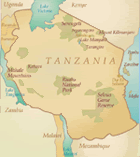The Education of Hally Mahler
Tonight the kids and I are flying back to the US for 12 days. In the run-up to returning “home” (to my parent’s house in NY) I have been thinking a lot about what I’ve learned during the past almost 8 months since we moved to Tanzania.
In my business there is a premium on people who have lived and worked in developing countries. I always resented that. Last year, I would have told you that living overseas was not really important to my work, since really what was needed were people who knew how to fly in, work with strangers from a different culture on some of the most sensitive issues imaginable, get the work done, and get the hell out.
This is still true of people who are providing short term technical assistance. But I understand now why when USAID is evaluating candidates for a posting overseas they are looking for people who have done it before. The truth is, this life, with all its bells and whistles is not for everyone. From the outside, from the perspective of someone who flies in and flies out, or from the viewpoint of a friend or relative, it is indeed a pretty enticing prospect. The “package” comes with big houses, lots of household help, beautiful gardens, exotic locations (safari, Zanzibar), tropical weather, and interesting people with whom to socialize.
If you wanted to, you could envelop yourself in the expat world so completely that you would hardly know where you were. There is a group of South Africans who live like that here. They come to Tanzania seeking the inequalities that made the years of apartheid so much fun for them. Here, their economic superiority and their clannishness enable them to live in a bubble – a throw back to 10 years ago when Africans had their place (working to serve) and Europeans had theirs (watching the sunset at the Yacht Club).
Of course, this is an extreme example, and it has made me digress from the point at hand. Most expats live a mixed reality – where we have all the luxuries, but also many of the challenges of developing world living. And believe me, these challenges are not for everyone.
You see, we are living in a different culture, a different society. Here, people struggle to get by. Even the rich and upper middle class have tremendous burdens unlike those we face in the US. Here, the more money you have, the more you HAVE to give away to your relatives and friends. This situations turns even very well paid people into virtual paupers. With no government safety net, family is it. My colleagues typically pay for 4 or 5 siblings or cousins to go to school, and help their parents and their aunts and uncles pay their daily expenses. Here, even going to a family wedding costs money. In Tanzania, wedding invitees pay for their “tickets” in advance of the wedding – not to mention gifts and travel to/from the event.
So given what I’ve just told you, it might seem reasonable that people would resort to extreme measures to have enough money to keep up. Before I came to Tanzania I was told by several people that while there was corruption and fraud here, it was pretty limited compared to other places.
I don’t believe that anymore.
Everywhere I look I see fraud perpetrated along a continuum from petty to severe. From my workplace where I’ve seen thousands of dollars misappropriated during procurements that clearly ended up in the pockets of our former leaders (how else would they be driving brand new Mercedes SUVs and Land Rovers with salaries significantly lower than mine and in a country where there is no financing); to the fruit vendor on the street who charges me the “white man’s tariff” when I buy my mangos (charging me twice or three times as much as a local).
You might think that some petty fraud is reasonable. After all, who can blame the vendor who sees a white face and knows they can get a little extra cash out of her? The problem is the slippery slope. At what point is it not ok to skim a little bit off the top? The more money you make the more burdens you have, and also the more pressure you have to live like “the big man”.
I wish I could tell you that the example from my workplace was extreme. But it is not. What I’ve learned over the past 8 months is that every single workplace faces similar problems. No accountant, operations manager, or procurement officer can be truly trusted. And scams, where they exist, are usually pervasive. They involve many people. They involve people you thought you trusted and respected. They involve people who you called your friend.
And, as a foreigner, you are almost helpless to stop it. Unless you go and double check all the bids for the December office stationary yourself, you have no way of knowing if the bids you got were all legitimate, or if they represent a carefully planed scam, giving both your staff and the stationary dealer 10% off the top.
If only this stopped at the workplace and in the markets.
I’ve been lucky in that, as far as I can tell, there has been no major fraud within my household, although you already know the story of the missing money. And did I tell you what one of my guards was also steeling diesel fuel from the generator? Well… he was. And I fired him.
But with the household staff, the problem is more about where to draw the line. They come to me asking for things all the time. Oftentimes I cough up the money immediately. Margaret had malaria and needed medication. Robert had a death in the family and needed help getting his relatives back to the village. Paul wanted to “borrow” the extra mattress I bought before my furniture came so that his new “nanny” (a cousin from the village) would have a bed to sleep on in his one room “apartment”.
No problem.
But Paul also wanted an $80 bicycle to get back and forth from work. Raymond wants $100 to take driving lessons. Margaret needed $50 to take English classes. And my landlord’s fundi wanted $100 to take driving lessons, too. (I was kind of pissed that he came to me rather than my landlord for this. I gave him about $20 towards the lessons and told him to never ask me for money again. Was this mean? I just don’t consider him my responsibility.)
Yesterday, Paul even asked if he could use my car on Christmas to take his family around to visit friends.
The onslaught never ends. And because of it, you kind of need to develop a hardened heart. Now I know why there is a premium on seasoned expats. Because some people end up letting it all in, and frankly, they can’t really function that way.
I could let the fraud and the constant requests for help get to me.
Sometimes it does. I must admit to you that I struggle with it. But I also work hard to get past it. There are so many wonderful things about Tanzania, Tanzanians, and this lifestyle and adventure that I’m living. Most of the time the good drowns out the bad and I enjoy all that is fabulous about this place.
Before I moved to Tanzania I was a virgin who thought that because I had already gotten to 3rd base I wasn’t so virginal after all.
I was wrong. In the last 8 months my cherry has been popped.
The education of Hally Mahler is certainly not complete, but it is now well underway.

In my business there is a premium on people who have lived and worked in developing countries. I always resented that. Last year, I would have told you that living overseas was not really important to my work, since really what was needed were people who knew how to fly in, work with strangers from a different culture on some of the most sensitive issues imaginable, get the work done, and get the hell out.
This is still true of people who are providing short term technical assistance. But I understand now why when USAID is evaluating candidates for a posting overseas they are looking for people who have done it before. The truth is, this life, with all its bells and whistles is not for everyone. From the outside, from the perspective of someone who flies in and flies out, or from the viewpoint of a friend or relative, it is indeed a pretty enticing prospect. The “package” comes with big houses, lots of household help, beautiful gardens, exotic locations (safari, Zanzibar), tropical weather, and interesting people with whom to socialize.
If you wanted to, you could envelop yourself in the expat world so completely that you would hardly know where you were. There is a group of South Africans who live like that here. They come to Tanzania seeking the inequalities that made the years of apartheid so much fun for them. Here, their economic superiority and their clannishness enable them to live in a bubble – a throw back to 10 years ago when Africans had their place (working to serve) and Europeans had theirs (watching the sunset at the Yacht Club).
Of course, this is an extreme example, and it has made me digress from the point at hand. Most expats live a mixed reality – where we have all the luxuries, but also many of the challenges of developing world living. And believe me, these challenges are not for everyone.
You see, we are living in a different culture, a different society. Here, people struggle to get by. Even the rich and upper middle class have tremendous burdens unlike those we face in the US. Here, the more money you have, the more you HAVE to give away to your relatives and friends. This situations turns even very well paid people into virtual paupers. With no government safety net, family is it. My colleagues typically pay for 4 or 5 siblings or cousins to go to school, and help their parents and their aunts and uncles pay their daily expenses. Here, even going to a family wedding costs money. In Tanzania, wedding invitees pay for their “tickets” in advance of the wedding – not to mention gifts and travel to/from the event.
So given what I’ve just told you, it might seem reasonable that people would resort to extreme measures to have enough money to keep up. Before I came to Tanzania I was told by several people that while there was corruption and fraud here, it was pretty limited compared to other places.
I don’t believe that anymore.
Everywhere I look I see fraud perpetrated along a continuum from petty to severe. From my workplace where I’ve seen thousands of dollars misappropriated during procurements that clearly ended up in the pockets of our former leaders (how else would they be driving brand new Mercedes SUVs and Land Rovers with salaries significantly lower than mine and in a country where there is no financing); to the fruit vendor on the street who charges me the “white man’s tariff” when I buy my mangos (charging me twice or three times as much as a local).
You might think that some petty fraud is reasonable. After all, who can blame the vendor who sees a white face and knows they can get a little extra cash out of her? The problem is the slippery slope. At what point is it not ok to skim a little bit off the top? The more money you make the more burdens you have, and also the more pressure you have to live like “the big man”.
I wish I could tell you that the example from my workplace was extreme. But it is not. What I’ve learned over the past 8 months is that every single workplace faces similar problems. No accountant, operations manager, or procurement officer can be truly trusted. And scams, where they exist, are usually pervasive. They involve many people. They involve people you thought you trusted and respected. They involve people who you called your friend.
And, as a foreigner, you are almost helpless to stop it. Unless you go and double check all the bids for the December office stationary yourself, you have no way of knowing if the bids you got were all legitimate, or if they represent a carefully planed scam, giving both your staff and the stationary dealer 10% off the top.
If only this stopped at the workplace and in the markets.
I’ve been lucky in that, as far as I can tell, there has been no major fraud within my household, although you already know the story of the missing money. And did I tell you what one of my guards was also steeling diesel fuel from the generator? Well… he was. And I fired him.
But with the household staff, the problem is more about where to draw the line. They come to me asking for things all the time. Oftentimes I cough up the money immediately. Margaret had malaria and needed medication. Robert had a death in the family and needed help getting his relatives back to the village. Paul wanted to “borrow” the extra mattress I bought before my furniture came so that his new “nanny” (a cousin from the village) would have a bed to sleep on in his one room “apartment”.
No problem.
But Paul also wanted an $80 bicycle to get back and forth from work. Raymond wants $100 to take driving lessons. Margaret needed $50 to take English classes. And my landlord’s fundi wanted $100 to take driving lessons, too. (I was kind of pissed that he came to me rather than my landlord for this. I gave him about $20 towards the lessons and told him to never ask me for money again. Was this mean? I just don’t consider him my responsibility.)
Yesterday, Paul even asked if he could use my car on Christmas to take his family around to visit friends.
The onslaught never ends. And because of it, you kind of need to develop a hardened heart. Now I know why there is a premium on seasoned expats. Because some people end up letting it all in, and frankly, they can’t really function that way.
I could let the fraud and the constant requests for help get to me.
Sometimes it does. I must admit to you that I struggle with it. But I also work hard to get past it. There are so many wonderful things about Tanzania, Tanzanians, and this lifestyle and adventure that I’m living. Most of the time the good drowns out the bad and I enjoy all that is fabulous about this place.
Before I moved to Tanzania I was a virgin who thought that because I had already gotten to 3rd base I wasn’t so virginal after all.
I was wrong. In the last 8 months my cherry has been popped.
The education of Hally Mahler is certainly not complete, but it is now well underway.

One of the lovely things about Tanzania. David and Hally in Zanzibar yesterday.
Mahlers On Safari will be on break until the first week in January. See you then. And Happy New Year everyone.











 Jaden and Rowan
Jaden and Rowan






